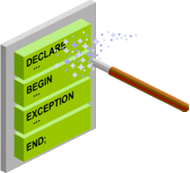PL/SQL Blocks
 The
basic construct in PL/SQL is a block. A block consists of a set of SQL
and/or PL/SQL statements, joined together and passed to the Oracle engine
all in one go.
The
basic construct in PL/SQL is a block. A block consists of a set of SQL
and/or PL/SQL statements, joined together and passed to the Oracle engine
all in one go.
- Declarative(optional): This section begins with the keyword DECLARE and ends when your executable section starts.
- Executable(required): This section begins with the keyword BEGIN and ends with END. The keyword END should be terminated with a semicolon.
- Exception handling(optional): The exception section is nested within the executable section. This section begins with the keyword EXCEPTION.
A PL/SQL program is comprised of one or more blocks. These blocks can be entirely separate or nested within another.
There are three types of blocks that make up a PL/SQL program:
- Anonymous blocks: These are the unnamed PL/SQL blocks that are embedded within an application or are issued interactively.
- Procedures: These are the named PL/SQL blocks. These blocks accept inbound parameters but won't explicitly return any value.
- Functions: These are the named PL/SQL blocks. These blocks accept inbound parameters and will always return a value.
The difference between a procedure and a function is that a function must return a value to the calling program.
